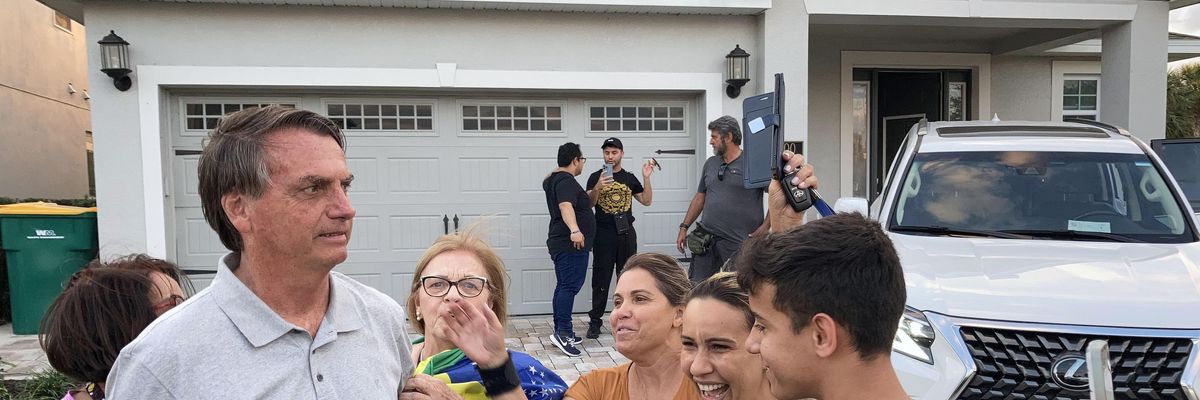Brazil's far-right ex-president Jair Bolsonaro has applied for a six-month visitor visa to remain in the United States amid worsening legal troubles in his home country.
U.S. authorities received Bolsonaro's application on Friday, The Financial Timesreported Monday, citing "his lawyer, Felipe Alexandre, who has advised the former president not to leave the country while it is being processed—a period that could last several months."
Bolsonaro is facing multiple investigations in Brazil. That includes longstanding probes into alleged wrongdoing committed during his four-year presidential term as well as the Brazilian Supreme Court's recently launched inquiry aimed at determining whether his incessant lies about electoral fraud are to blame for the coup attempt that his supporters launched in Brasília on January 8.
The close ally of former U.S. President Donald Trump—whose unceasing lies about his loss in the 2020 presidential election sparked a deadly right-wing insurrection in Washington two years ago—retreated to Florida on December 30, two days before the January 1 inauguration of his leftist successor, Luiz Inácio Lula da Silva, commonly known as Lula.
"He has been staying at the Kissimmee home of a former mixed martial arts fighter, José Aldo, where he is often thronged by adoring members of Florida's right-leaning Brazilian expat community," the Times noted. "Bolsonaro had been traveling on an A-1 visa reserved for diplomats and heads of state. It expired the day he left office, with a 30-day grace period."
Earlier this month, several members of U.S. Congress urged the Biden administration to rescind Bolsonaro's visa.
"We must not allow Mr. Bolsonaro or any other former Brazilian officials to take refuge in the United States to escape justice for any crimes they may have committed when in office," stated a letter to the White House signed by 41 Democratic lawmakers.
Alexandre claimed that there is no evidence that Bolsonaro committed any crimes related to the anti-democratic assault in Brasília, when his election-denying supporters ransacked Brazil's presidential palace, Congress, and Supreme Court.
Bolsonaro has tried to distance himself from the rioters, saying that they "crossed the line." In December, however, Bolsonaro broke his post-election silence to tell his backers—many of whom spent weeks after the October 30 runoff calling for a military coup to prevent Lula from taking office—that his political fate rested in their hands.
"Who decides where I go are you," Bolsonaro told a crowd outside the gates of the presidential residence on December 9. "Who decides which way the armed forces go are you."
Days later, hundreds of Bolsonaristas set fire to cars and buses and tried to breach federal police headquarters in Brasília in a preview of the larger January 8 insurrection.
A bigger right-wing mob invaded Brazil's main government buildings earlier this month under the false pretense that Lula's victory in October's election was the result of widespread fraud—a mistaken belief fueled by years of Bolsonaro and his allies' baseless attacks on the integrity of the country's election infrastructure, disinformation that spread rapidly on social media.
The day after the attack, thousands of democracy defenders took to the streets of Rio de Janeiro and São Paulo to demand jail time for those who carried out the violence as well as those who aided and abetted it.
Sen. Tim Kaine (D-Va.), head of the Senate Foreign Relations Committee's Western Hemisphere panel, said earlier this month that the U.S. should comply if Lula's administration requests Bolsonaro's extradition.
Alexandre, meanwhile, told the Times that Bolsonaro "might eventually decide to petition for a more permanent U.S. visa than the six-month extension he is seeking."

